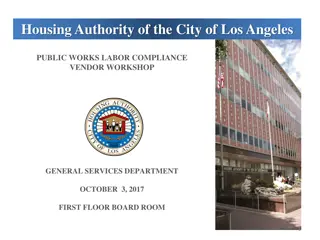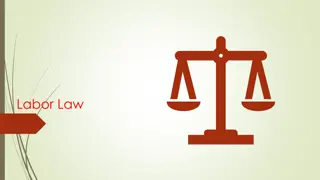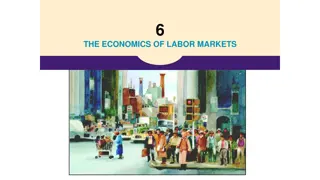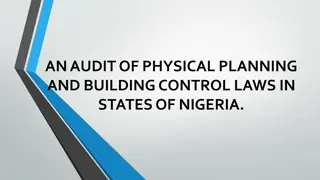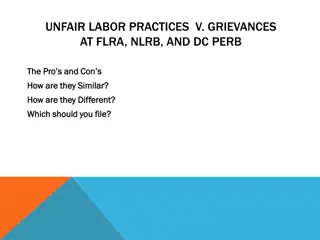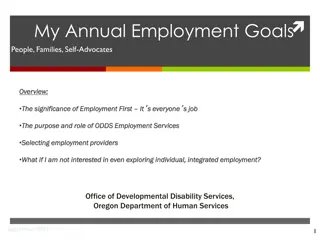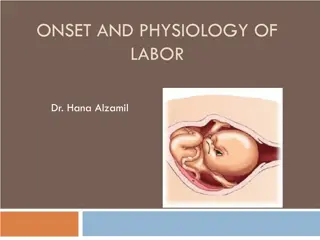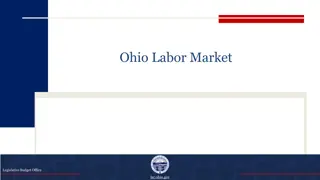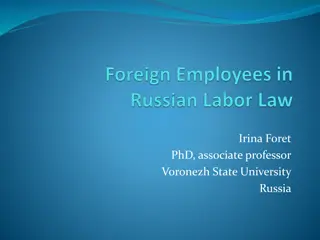Understanding Employment and Labor Laws in Nigeria
This structured guide provides insights into the employment laws and regulations in Nigeria, covering employee classification, terms of employment, industrial relations, and termination. It highlights key federal laws governing areas such as pensions, taxation, employee compensation, training, immigration, health insurance, and trade unions. The guide also discusses emerging trends in Nigerian employment law and offers a comprehensive overview of the legal framework that governs the labor landscape in the country.
Download Presentation

Please find below an Image/Link to download the presentation.
The content on the website is provided AS IS for your information and personal use only. It may not be sold, licensed, or shared on other websites without obtaining consent from the author. Download presentation by click this link. If you encounter any issues during the download, it is possible that the publisher has removed the file from their server.
E N D
Presentation Transcript
Nigeria: A Structured Guide to Employment and Labor Laws Febuk Uya LLM Corporate and Commercial Law Track Candidate, May 2021 IU McKinney School of Law
OUTLINE Employment Laws and Regulations Employee/Independent Contractor classification Terms and Conditions of Employment Employment Representation and Industrial Relations Termination of Employment Emerging trends in Nigerian Employment Law Conclusion
Employment Laws and Regulations The Constitution of the Federal Republic of Nigeria 1999 (as amended) (the Constitution ); The Labor Act, Chapter L1, Laws of the Federation of Nigeria 2004 ( Labour Act ); National Industrial Court of Nigeria Act 2006 ( NICN ); and Federal laws enacted by the National Assembly (Nigeria s national legislative houses) that relate to labor and employment, pension, and workplace compensation
Federal Laws The Pension Reform Act 2014, which regulates the contributory pension scheme; The Personal Income Tax Act (Chapter P8 LFN 2004, as amended by the Personal Income Tax (Amendment) Act 2011), which regulates the taxation of employees remuneration; The Employees Compensation Act 2010, which regulates the payment of compensation to employees who suffer occupational diseases or sustain injuries arising from accidents in the workplace or during employment; The Industrial Training Fund Act (Chapter I9 LFN 2004, as amended), which requires employers to contribute 1% of their annual payroll to the Industrial Training Fund created by the act; The Immigration Act 2015, which regulates the employment of foreign nationals; The National Health Insurance Scheme Act (Chapter N42 LFN 2004), which established the national health insurance scheme; and The Trade Unions Act (Chapter T14 LFN 2004, as amended), which regulates the organisation of trade unions and their activities.
Employee/Independent Contractor Classification Two broad categories of employees in Nigeria: - Workers defined under the Labour Act as those who are generally employees who perform manual labor or clerical work ; and - employees who perform administrative, executive, technical or professional functions (referred to as Non-workers ) Labour Act is limited in its scope of application as it regulates only the employment of workers
Employee/Independent Contractor Classification (conti.) Specific rules regarding employee/contractor classification: Other than the Labor Act, no specific law sets out what factors would be considered in ascertaining whether an individual is an employee or an independent contractor. See SS Co Ltd v Afropak (Nig) Ltd ((2008) 18 NWLR 77 at p82) the Supreme Court prescribed the following criteria to provide guidance in making this determination: the mode of payment; ownership of the equipment, tools or instruments used in providing the services; the ability to delegate duty; the hours of work; the place where the work is carried out; and the provision of office accommodation and a secretary. - - - - - -
Distinction Btw Local and Foreign Nationals An employer which wishes to employ foreign nationals must obtain a specific authorisation from the Nigeria Immigration Service for approval - the maximum number of foreign nationals the employer can engage; - their job designations and the duration of such employment; - employers must show that there are no suitably qualified Nigerian employees for the positions to be occupied by foreign nationals; and - where approval is granted, local nationals are expected to be trained to fill the positions over time; - these requirements do not apply to the employment of local nationals and nationals of member states of the Economic Community of West African States (ECOWAS).
Terms and Conditions of Employment Form of Contracts of Employment for workers: - oral or written - express or implied. - Exception in Section 7 of the Labor Act requires every employer to issue a written contract within three (3) months of the commencement of an employment relationship Forms of Contract of Employment for non-workers: - With respect to non-workers, no statutory requirements for employment contracts to be in writing. - Precedence shows employers enter written contracts for ease of reference and clarity of employment terms
Terms and Conditions (conti.) - - Express Terms: Subject to provisions of the Labor Act. Applicable to workers only Terms and Conditions of non-workers are primarily subject to the terms of their respective employment contracts Implied Terms: Applicable in contract of employment in Nigeria. Examples are Employer s duty to provide work to employees, and to provide a safe place to work Minimum employment terms and conditions set down by law: The Labor Act prescribes the minimum terms and conditions of employment that employers must comply with in relation to workers - -
Employee Representation and Industrial Relations The Trade Unions Act, Chapter T14, Laws of the Federation of Nigeria 2004 ( TUA ) generally governs the activities of trade unions in Nigeria Trade unionism does not apply to employees holding management positions Trade Union Rights - Negotiate terms and conditions of employment with employers; - Embark on an industrial strike action; and - Engage in peaceful picketing
Employee Representation and Industrial Relations (conti.) The TUA prohibits trade unions from carrying out a strike or lock-out Exception to rules governing a trade union s right to take industrial action - Not engaged in the provision of essential services; - The strike or lock-out is in relation to a labor dispute; - The strike or lock-out concerns a dispute arising from a collective and fundamental breach of employment contract on the part of an employee, trade union, or an employer; - Compliance with TUA arbitral provisions; and - A simple majority of all registered members voted to go on strike
Termination of Employment Notice - Employers must give notice of the termination of employment, but an employer may elect to make a payment in lieu of the notice - Protections Section 11 of the Labour Act prescribes statutory notice periods - Employees may challenge their dismissal by instituting an action at the National Industrial Court of Nigeria ( NICN )
Emerging Trends The introduction of the concept of constructive dismissal or constructive termination of employment and the award of damages for wrongful termination; Right to appeal NICN decisions. Next resort available to employees- the Court of Appeal; and The re-evaluation of triangular employment arrangements
Conclusion Up-to-date on employment laws and regulations Employers and investors in the private sector generally have little cause to worry about trade union activities by employees, provided that the employers: - pay reasonably decent wages and allowances; - strive to maintain fair working conditions; - desist from unfair labour practices; and - encourage dialogue with the trade unions.
References https://www.lexology.com/library/detail.aspx?g=a129b4ab-faaf-412c-995e- 4d3502fceb54 https://iclg.com/practice-areas/employment-and-labour-laws-and- regulations/nigeria http://tucnigeria.org.ng/ www.punchng.com www.depositphotos.com
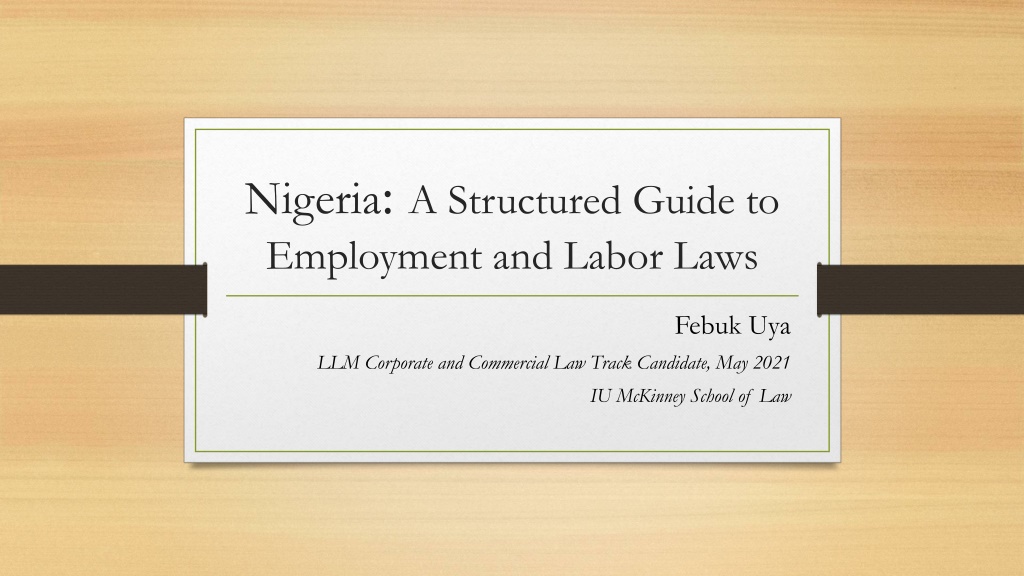
 undefined
undefined








